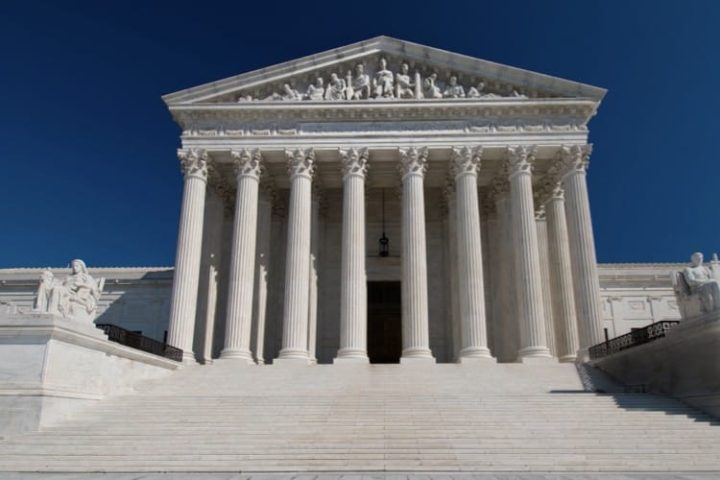
This month, the Supreme Court will likely issue its ruling in Brnovich v. Arizona Democratic National Committee, a case that will either help or hinder efforts to protect future elections and to maintain election integrity.
The case revolves around two basic policies in Arizona. The first policy invalidates ballots that are cast at the wrong precinct. In accordance with Arizona law, each county is permitted to choose a vote-center or a precinct-based system for in-person voting. The former allows registered voters to vote at any polling location in the county, while the latter only permits registered voters to vote at the designated polling place in their precinct. If a voter casts a ballot in the wrong precinct, that ballot is invalidated in its entirety (even for statewide elections).
The Democratic National Committee challenged this policy on the grounds that Arizona had a history of changing precinct locations, and that the policy violated Section 2 of the voting Rights Act because it disproportionally impacted minority voters. Section 2 of the Voting Rights Act prohibits any “standard, practice, or procedure … which results in a denial or abridgement of the right of any citizen of the United States to vote on account of race or color.”
The second policy pertains to a ban on so-called “ballot harvesting.” While Arizona permits early voting, Republican legislators passed H.B. 2023 in 2016, which, in essence, prohibited third-party collection and delivery of absentee ballots (with few exceptions). Since many minorities used third-party carriers to drop off early votes, the Democratic National Committee argued that H.B. 2023 violated Section 2 of the Voting Rights Act as well as the 15th Amendment.
Initially, Arizona prevailed on all claims, and a three-judge panel of the U.S. Court of Appeals for the Ninth Circuit affirmed the ruling. The ruling was subsequently reversed by the same court when it heard the case en banc. As a result, the Supreme Court subsequently agreed to hear the case.
The significance of the high court’s ruling in this case cannot be overstated. In essence, the Supreme Court could very well create a workable standard for “vote denial” cases that arise under Section 2 of the voting Rights Act. In other words, what is the standard that courts should apply when assessing whether an election policy denies the right to vote on the basis of race or color pursuant to Section 2?
For example, when the full Ninth Circuit ruled against the Arizona policy invalidating ballots, it utilized a “results test,” which concentrates on discriminatory results, not merely purposeful discrimination by state policymakers. As Christopher Kieser explains in SCOTUSblog:
Even though the impact of out-of-precinct votes was minimal by any standard — less than 1% of all votes cast in recent elections — the court held that the racial makeup of the voters who cast these ballots rendered it suspect under Section 2. It reasoned that because minority voters were more likely to move and to live farther away from their assigned precinct, the policy against counting ballots cast in the wrong precinct “results” in the denial of the right to vote on account of race. The court did not meaningfully consider Arizona’s interest in streamlining election administration.
Opponents to such a broad interpretation call for a much narrower reading. Notably, some promote an “equal opportunity” approach, arguing that Section 2 is meant to provide everyone with an “equal opportunity” to vote. Therefore, for example, if a voter is unable to vote at the designated precinct location, he/she can still utilize one of the other voting methods that are permissible under Arizona law. In other words, the focus should be on “equal opportunity,” not “results.”
Clearly, the court’s ultimate interpretation will either expand or limit the application of Section 2, and could have far-reaching implications throughout the country as states continue their efforts to toughen election law in an effort to maintain election integrity.
Along these same lines, the court’s ruling with respect to “ballot-harvesting” will also have far-reaching implications. Historically, ballot harvesting has resulted in wrongdoing and improper conduct. This is understandable for several reasons. First, when a third party (who is not an immediate family member and who oftentimes has an “interest” in the outcome of the election) takes a ballot to deliver, there is no way to determine whether the ballot was compromised or somehow altered. Ballot harvesting also results in voter intimidation or voter “payoffs,” both of which are improper. As there is no supervision, third parties can also influence voters while they are casting their ballot(s). Finally, there is no way to guarantee that all ballots are delivered and/or that a third party did not simply throw away the ballots belonging to people who made their selection public and with whom he/she disagreed. Some examples can be found here and here.
The Supreme Court’s decision in Brnovich is crucial for purposes of election integrity. After the 2020 election, the nation learned a painful, yet valuable lesson. The nation’s election law need to be tougher, more strict, safer, less susceptible to fraud, forgery, and coercion, and more strictly enforced. Republicans have started this trend by enacting tougher state election laws in Georgia and in Florida. They are also conducting audits in Arizona (Democrats are also participating, yet objecting to such audits) and elsewhere to learn how to best ensure election integrity going forward. Democrats, on the other hand, have proposed such things as H.R.1, which will federalize the elections and make then much less safe.
For these reasons, the high court’s upcoming decision is vital, as it will either help or hinder efforts to maintain the integrity of the nation’s elections for the indefinite future.




